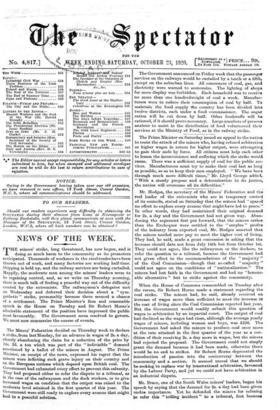The Miners' Federation decided on Thursday week to declare a
strike, from last Monday, for an advance in wages of 2s. a day, silently abandoning the claim for a reduction of the price by 148. 2d. a ton which was part of the " indivisible " demand sanctioned by a ballot of the miners in August. The Prime Minister, on receipt of the news, expressed his regret that the miners were inflicting such grave injury on their country and on the European nations which depend upon British coal. The Government had exhausted every effort to prevent this calamity. They had proposed either to refer the dispute to a tribunal, as in the case of the railwaymen and the dock workers, or to give increased wages on condition that the output was raised to the moderate level attained in the first quarter of this year. The Government were still ready to explore every avenue that might had to a peaceful solution.
The Government announced on Friday week that the pas.senger services on the railways would be curtailed' by a tenth or a fifth, except on the suburban lines. All consumers of coal, gas, and electricity were warned to economize. The lighting of shops for mere display was forbidden. Each household was to receive no more than one hundredweight of coal a week. Manufac- turers were to reduce their consumption of coal by half. To maintain the food supply the country has been divided into twelve districts, each under a food commissioner. The sugar ration will be cut down by half. Other foodstuffs will be rationed, if it should prove necessary. Large numbers of persona anxious to assist in the distribution of food volunteered their services at the Ministry of Food, as in the railway strike.


































